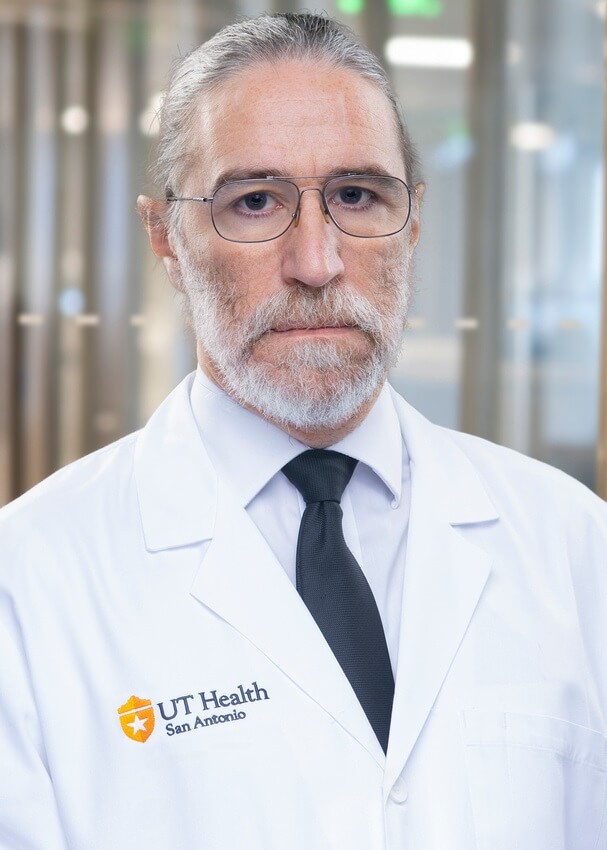COVID-19’s long-term effects on cognition in older adults will be studied for five years thanks to a $32 million federal grant awarded to The University of Texas Health Science Center at San Antonio (also called UT Health San Antonio).
The National Institute on Aging (NIA) grant, with UT Health San Antonio as the coordinating center, focuses on recruitment and analysis of populations most severely affected by long COVID:
- Hispanic Mexican Americans in San Antonio and Laredo, Texas.
- Hispanics and African Americans of Caribbean descent in the Bronx, N.Y.
- Non-tribal Native Americans in Seattle, Wash.
- Amerindians in Jujuy, Argentina.
- Africans of Yoruba ancestry in Ibadan, Nigeria.

“Cognitive impairment is seen in some adults over 60 who are experiencing long COVID, and this impairment appears to be progressive. We will study the genetics of older individuals in these specific lineage cohorts that proved to be at higher risk for COVID sequalae during the pandemic,” said the study’s lead principal investigator, Gabriel de Erausquin, MD, PhD, MSc, professor of neurology at UT Health San Antonio’s Glenn Biggs Institute for Alzheimer’s and Neurodegenerative Diseases.
The researchers will perform whole-genome sequencing on samples from 4,300 study participants to understand genetic variations that protect some older people against long COVID cognitive impairment. They will likewise seek to discover variations that make other people over 60 more prone to impairment.
“What is the underlying biology?” de Erausquin asked. “We have some preliminary genetic data already, but we’ve only looked at 500 individuals, so we are early in the process.”
Participant recruitment is beginning in San Antonio and Laredo, he said. In Webb County, the Biggs Institute is partnering with the Laredo Health Department and The University of Texas Education and Research Center at Laredo.
 The researchers will also analyze biomarkers from blood samples taken at intervals over the five years. Proteins and antibodies in plasma are expected to shed light on immune responses over time in the participants.
The researchers will also analyze biomarkers from blood samples taken at intervals over the five years. Proteins and antibodies in plasma are expected to shed light on immune responses over time in the participants.
The team will conduct magnetic resonance imaging (MRI) studies, as well, to determine whether there is shrinkage in brain structures related to memory function.
“Some of the expectation is that our collective efforts will illuminate genetic and other factors that predispose people to developing Alzheimer’s disease after COVID-19 and other infections,” de Erausquin said.
The Alzheimer’s Association is a funding contributor to this three-continent initiative. The association’s support will go to Washington University in St. Louis, Mo., which is leading the biomarkers research core of the study, and to Albert Einstein College of Medicine in New York, which is leading a study of biomarkers as predictors of outcomes.
International consortium
The Alzheimer’s Association Consortium on Chronic Neuropsychiatric Sequelae of SARS-CoV-2 began in 2021 and includes the participant enrolling sites. “Seed money from the Alzheimer’s Association supported the creation of this international consortium,” de Erausquin said. “This earlier funding also sponsored data collection in Argentina during the first couple of years of the pandemic.”
The Argentine sample is from inhabitants of the Andes region on the country’s border with Chile and Bolivia. De Erausquin spent time there during and after the acute phase of the pandemic getting the effort underway.
Reflecting demographics
South Texas is another target. “The San Antonio and Laredo sample will be 60% to 90% Hispanic, matching the ethnic makeup of the region,” de Erausquin said.
The goal of the five recruitment sites is to identify and enroll a study population that is as representative of under-represented minorities as possible and consists of ethnic groups most affected by the COVID-19 pandemic, he said.
UT Health San Antonio is the primary grant awardee, and subcontracts will go to Albert Einstein School of Medicine, to the University of Washington in Seattle, to the Laredo Health Department, to Fundacion FULTRA in Argentina and the University of Ibadan in Nigeria.
Notes
The project is titled “Interaction between SARS-CoV-2 Infection and Ancestral Genomic Variations in the Risk of Alzheimer’s Disease” (ISAVRAD).
De Erausquin is the Zachry Foundation Distinguished Professor of Alzheimer’s Clinical Care and Research and the Greehey Family Foundation Distinguished University Professor of Alzheimer’s Research at UT Health San Antonio. He conducts studies at the Biggs Institute and the Research Imaging Institute at UT Health San Antonio.
The Biggs Institute is a national center of excellence that, in collaboration with The University of Texas Rio Grande Valley, is the state’s only Alzheimer’s Disease Research Center (ADRC) as designated by the National Institute on Aging.


